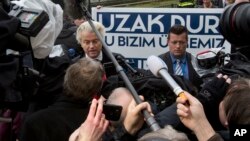Turkey's foreign minister, Mevlut Cavusoglu, was barred Saturday from landing in the Netherlands as opposition grows to Turkish campaigning throughout the European Union.
Turkish President Recep Tayyip Erdogan condemned the action strongly, calling his NATO partner a "Nazi remnant" - the second comparison he has made between a European nation and Nazis this week.
"It was a crazy remark, of course," Dutch Prime Minister Mark Rutte told reporters Saturday. "I understand they are angry but this is, of course, way out of line."
Shortly after these comments, state-run Anadolu news agency announced that Turkey's Family Minister, Fatma Betul Sayan Kaya, who currently is in Germany, would travel to the Netherlands by land, even though the events at which she was scheduled to speak have since been canceled.
Many European Union countries objected to visits by Turkish ministers campaigning ahead of a referendum to change Turkey's constitution. Ankara wants to drum up support among the millions of Turks living in Europe to give Erdogan more powers, which could see him remain in office until 2029.
Tensions have been building for several days, as local authorities in Austria and Germany blocked appearances by Turkish ministers hoping to rally supporters in Europe.
Watch: Turkey-Europe Row Deepens
Cavusoglu invited supporters onto the grounds of its consulate in Hamburg on Tuesday, after he was barred from using another building in the German city.
Berlin called Erdogan's earlier comparison of Germany's response to the actions of the Nazis "unjustifiable."
‘No room’ for campaigning
Dutch far-right leader Geert Wilders waded into the debate this week ahead of a planned rally at The Hague.
“We are in Holland here, not in Turkey, and a Turkish minister has no room here to lobby for somebody like Erdogan, who is a mere dictator," Wilders said.
Ankara blames what it calls growing fascism in Europe - and has cast the rift as an attempt by Europe to influence the outcome of the April 16 referendum.
Analyst Kamran Matin of the University of Sussex says Turkey has sought to exploit the rift.
“It was really stemming from the German authorities’ concern for the German-Kurdish relation within Germany because a large number of Turkish citizens living there are of Kurdish origin," Matin said. "But I think the Turkish government and Recep Tayyip Erdogan especially, they very quickly seized on this and rechanneled it toward their campaign for changing the structure of the state.”
Europe has made clear its concerns over the path of the Turkish government. More than 40,000 people have been arrested since a failed coup last July – including last month's arrest of a German journalist based in Turkey. The EU fears giving the president more powers would further undermine democracy.
But Europe - and especially Germany - needs to keep Turkey onside, according to Matin.
“The refugee deal they have with the EU, and especially with respect to Germany, is crucial leverage they have over Germany," he said. "And the flow of refugees would have immediate impact in German domestic politics. Turkey is such a geopolitically important state and actor for not only European countries, but the entire Western bloc, especially facing the resurgence of Russia.”
Berlin has voiced hope that diplomatic relations will improve after the referendum.















